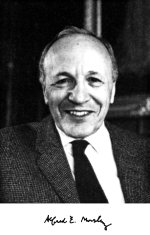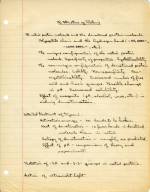|
Pauling's work on magnetic properties of hemoglobin piqued his interest in other proteins;
however, he already was intrigued by them. While visiting the Rockefeller Institute
in spring of 1935, Pauling convinced Simon Flexner, the institute's president and
a member of the Rockefeller Foundation's board of trustees, to send Alfred E. Mirsky to Caltech for one year. Pauling and Mirsky analyzed the structure of native, denatured
and coagulated proteins during the same time that Pauling and Coryell researched the
magnetic properties and structure of hemoglobin and its derivatives.
Mirsky already knew a good deal about the denaturation of proteins and had worked
on the denaturation of hemoglobin, thus Pauling hoped that Mirsky would help him improve
his own understanding of proteins. Together they investigated what happens structurally
when a native protein (in the natural state) is denatured (altered). They found that
the tertiary structure of native proteins (i.e. the structure produced when a sequence
of amino acids folds and binds to itself) depends upon hydrogen bonds, which allow
the folded protein to hold its shape. During denaturation the hydrogen bonds break
down and the protein loses its tertiary structure. Hemoglobin was one of the substances
they analyzed.
Pauling's knowledge about hemoglobin and its derivatives would greatly aid his ability
to understand the sickling process undergone by sickle cell hemoglobin. However, this
was not for another seven years, in which time he learned more about chemical reactions
within the human body, especially about immunology.
|
|
Click images to enlarge

Portrait of Alfred E. Mirsky, 1960s.

"The Structure of Proteins." 1936.
"I went to New York and gave a seminar at the Rockefeller Institute for Medical Research,
in 1936. And at that time, I asked the director, Simon Flexner, to send Alfred Mirsky
and his family to Pasadena to be with us for a year, because of my interest in hemoglobin.
So Mirsky came. Mirsky was astonished that I would have the temerity to approach Flexner
-- I was a brash young man, I think -- and then astonished that it worked out!"
|

